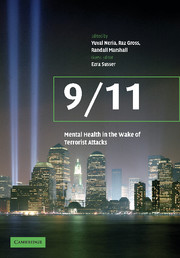Book contents
- Frontmatter
- Contents
- Acknowledgments
- Editors brief bio
- List of contributors
- Foreword
- Part I Introduction
- Part II The psychological aftermath of 9/11
- Part III Reducing the burden: community response and community recovery
- Part IV Outreach and intervention in the wake of terrorist attacks
- Part IV A New York area
- Part IV B Washington, DC
- Part IV C Prolonged-exposure treatment as a core resource for clinicians in the community: dissemination of trauma knowledge post-disaster
- Part V Disasters and mental health: perspectives on response and preparedness
- 29 The epidemiology of 9/11: technological advances and conceptual conundrums
- 30 Searching for points of convergence: a commentary on prior research on disasters and some community programs initiated in response to September 11, 2001
- 31 What mental health professionals should and should not do
- 32 Coping with the threat of terrorism
- 33 Life under the “new normal”: notes on the future of preparedness
- 34 Lessons learned from 9/11: the boundaries of a mental health approach to mass casualty events
- 35 Learning from 9/11: implications for disaster research and public health
- Index
33 - Life under the “new normal”: notes on the future of preparedness
from Part V - Disasters and mental health: perspectives on response and preparedness
Published online by Cambridge University Press: 27 October 2009
- Frontmatter
- Contents
- Acknowledgments
- Editors brief bio
- List of contributors
- Foreword
- Part I Introduction
- Part II The psychological aftermath of 9/11
- Part III Reducing the burden: community response and community recovery
- Part IV Outreach and intervention in the wake of terrorist attacks
- Part IV A New York area
- Part IV B Washington, DC
- Part IV C Prolonged-exposure treatment as a core resource for clinicians in the community: dissemination of trauma knowledge post-disaster
- Part V Disasters and mental health: perspectives on response and preparedness
- 29 The epidemiology of 9/11: technological advances and conceptual conundrums
- 30 Searching for points of convergence: a commentary on prior research on disasters and some community programs initiated in response to September 11, 2001
- 31 What mental health professionals should and should not do
- 32 Coping with the threat of terrorism
- 33 Life under the “new normal”: notes on the future of preparedness
- 34 Lessons learned from 9/11: the boundaries of a mental health approach to mass casualty events
- 35 Learning from 9/11: implications for disaster research and public health
- Index
Summary
Introduction
Being prepared for emergencies is not a new concept. At every level of government there are contingency plans for natural disasters, accidental catastrophes, local events and personal emergencies of every conceivable manner. Organizations from the Red Cross to the Federal Emergency Management Agency to hospital emergency departments are in a constant state of readiness. Often, regionally specific plans are in place based on expectations of particular kinds of disasters: earthquakes in the West, hurricanes on the East Coast, tornados in the Midwest. In fact, long before 9/11, even terrorism had been on the minds of at least a handful of stalwart preparedness experts – mostly in the military and in special governmental agencies (Benjamin & Simon, 2002; Stern, 2003; Clarke, 2004).
Yet the attacks of 9/11 on New York City, Washington, DC, the downing of a hijacked passenger airliner in Pennsylvania and the many events that followed have radically changed our perceptions and expectations of what it means to be prepared for emergencies. The USA can be seen as undergoing a societal and political transformation of major proportions, similar in many ways to the Great Depression or the Japanese attack on Pearl Harbor, as two examples of transformational events of the last century.
And, as if to emphasize this transformation, the terrible events of 9/11 were followed by other tragedies, marking just the beginning of a series of traumatic experiences that have, collectively, affected the nation in a profound, multi-dimensional way. Hard on the heels of the 9/11 attacks, in the fall of and into the Winter of 2001, we confronted the still unexplained anthrax attacks, followed by sniper shootings in the Washington,DC region, and then the prospect of needing to vaccinate the entire country against smallpox terrorism?
- Type
- Chapter
- Information
- 9/11: Mental Health in the Wake of Terrorist Attacks , pp. 592 - 604Publisher: Cambridge University PressPrint publication year: 2006
- 2
- Cited by



